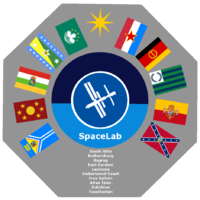SpaceLab
 SpaceLab in orbit over Urth | |
 SpaceLab Mission 1 mission patch | |
| Station statistics | |
|---|---|
| Call sign | SpaceLab |
| Crew | 24 |
| Launch |
February 14, 2018 17:30:00 UTC |
| Mission status | Underway |
| Mass | 1,249,365 kg (2,754,378 lb) |
| Length | 243.1 m (797.2 ft) |
| Width | 81.5 m (244.5 ft) |
| Height | 62.7 m (188.1 ft) |
| Typical orbit altitude | 450 km (280 miles) |
The Spacelab is a space station in Low-Urth orbit (LUO.) An international collaboration that was initially coordinated by South Hills in mid-2017, it has since grown to involve 12 nations in various areas of construction, research, and supply. Comprised of over 25 modules and trusses, the Spacelab is the largest sentient-built object launched into space and is visible from most of Urth's surface with the unaided eye. Sections of the station are made up of contributions from South Hills, Kuthernburg, East Cerdani, Xagrurg, Free Syllvin, Tretrid, and the Atlae Isles.
The primary purpose of the Spacelab is to serve as an outpost in which to conduct scientific experiments in the effects of microgravity. Currently, the station supports research into chemical reactions, biology, botany and agriculture, astronomy, astrophysics, and stellar magnetics. It also maintains a suite of refueling systems that can be used to resupply spacecraft traveling to or from destinations elsewhere in Urths' orbit or beyond, potentially serving as a jump-off point for missions to the moon or other planets.
The station has an intentional crew capacity to support 28 people. There is sufficient space aboard the habitation and storage modules for short-term visitors to stay in temporary sleeping bags; however, the life support systems can only maintain a sufficient air and water supply for 25 people for long periods of time. The crew compliment will rotate off in shifts of several months, which is different for each participating nation, due to the effects of spaceflight on living beings. The station is serviced and supplied primarily by the shuttles of the Emberwood Coast Space Exploration Administration, with personnel and cargo support from the orbiters of participating nations.
Currently, the station has a total crew compliment of twenty four individuals: four-person crews from Free Syllvin, Xagrurg, and Kuthernburg, three from South Hills and the Atlae Islands, two from East Cerdani, and single individuals from Lazlowia, Zukchiva, Tuvaltastan, and Lapimuhyo. The crew is multi-species as well, boasting two Vulpines and a Lutryne along with the human crewmembers. Each nation that contributes more than two astronauts is required to contribute a living module for them to stay in; otherwise, they are welcome to have their personnel bunk in any open habitation space in another area. The position of station commander, who is responsible for the organization and mission planning of the entire station, as well as the authority on crew saftey, health, rescue, and resupply, is rotated among the senior members of the crew. Currently, the commander of the station is Commander Charles May of South Hills. He will retain his position until the next crew launch mission, at which point he will transfer command to another nation's senior representative.
Spacelab is one of few manned orbital installations left in orbit, and the first to be built after the Kessler syndrome that was a result of the Four Days War. Many nations are critical of the project, citing high development and sustainment costs of such a massive orbital installation, the logistical difficulty of nearly a dozen competing nations launching supply and crew replenishment missions, and the difficulty of integrating the disparate countries and cultures into a cohesive working environment. However, participants have each signed agreements and made the necessary preparations to ensure that the station is operation and habitable for the foreseeable future, which includes avoiding the militarisation of the station itself, speaking Codexian as a common language while aboard, and to afford each nation the right to prosecute any crimes occurring in their respective sections of the station.
